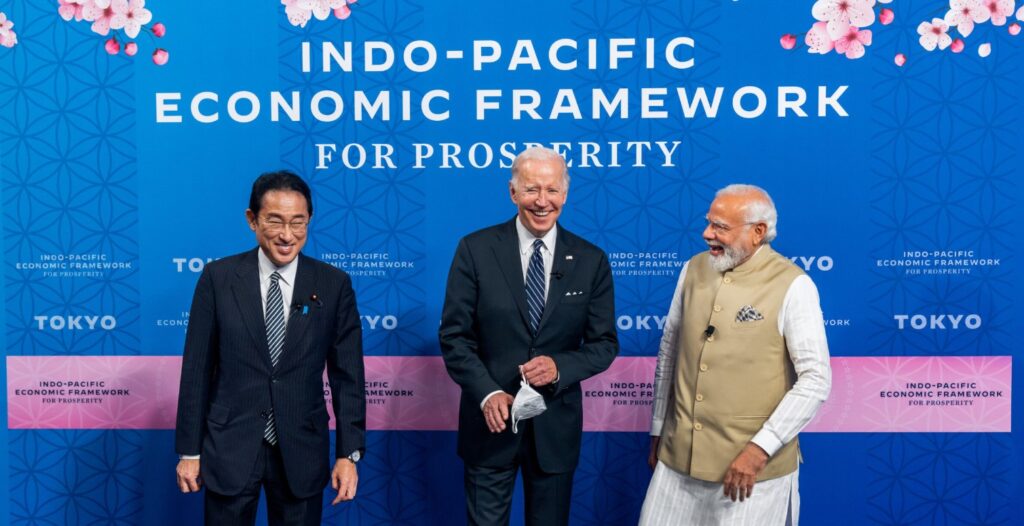Recently, the Minister of Commerce & Industry participated in the Indo-Pacific Economic Framework (IPEF) Ministerial meeting in the US, where India decided not to participate in the Fair & Resilient Trade Pillar. India, however, agreed to three other pillars: Supply Chains, Tax & Anti-Corruption, and Clean Energy. Here Indo-Pacific Economic Framework (IPEF) Explained and you will know It is good or bad for India. Also, How it will impact on Indian Economy.

What Is Indo-Pacific Economic Framework (IPEF)? Explained
The IPEF is a US-led initiative aimed at strengthening economic partnerships among participating countries in the Indo-Pacific region. It was launched in 2021 with initial partners representing 40% of the world GDP. While it is not a Free Trade Agreement (FTA), it allows members to negotiate specific aspects they are interested in. The framework is organized into four main pillars: supply-chain resilience, clean energy and decarbonization, taxation and anti-corruption, and fair and resilient trade. India, along with 13 other countries in the Pacific Ocean region, is currently a member of the IPEF.
India to Join Indo-Pacific Economic Framework
India has been cautious about joining the IPEF, considering the potential benefits and whether certain aspects of the framework may discriminate against developing countries or conflict with India’s interests. For example, India has concerns about the digital governance aspects of the IPEF, as they may contradict India’s own digital framework and laws, particularly regarding privacy and data protection. The US has also raised concerns about India’s data localization policies, which could be seen as barriers to digital trade.
Unlike traditional trade agreements, the IPEF offers flexibility to its members. They can choose which pillars to participate in, and India has chosen to join the three pillars mentioned earlier while staying away from the fair and resilient trade pillar.
How Indo-Pacific Economic Framework Will Impact India?
India’s vision for the Indo-Pacific region involves actively engaging in trade and investments, particularly with countries in the East. India has pursued comprehensive economic partnership agreements with Japan, South Korea, and Singapore, as well as free trade agreements with ASEAN and Thailand. India advocates for a Free and Open Indo-Pacific and aims to work with like-minded countries, including its Quad partners (US, Australia, Japan), to establish a rules-based, multipolar regional order that prevents any single power from dominating the region or its waterways.
Why are 14 Other Countries Losing Their Reliance On China?
In a significant development aimed at reducing their dependence on China, 14 nations participating in the International Partnership for Economic Freedom (IPEF) have joined forces to forge stronger supply chains. As global economic dynamics continue to evolve, these countries have recognized the need for diversification and increased resilience in their supply networks. By fostering closer economic ties and collaboration, they aim to mitigate risks and strengthen their respective economies. This article explores the recent initiative undertaken by the IPEF nations and its potential implications for the global economic landscape.
The 14 nations comprising the IPEF, including major economies such as the United States, Japan, Australia, and India, have acknowledged the vulnerabilities associated with heavy reliance on a single source for critical supplies. The ongoing COVID-19 pandemic exposed the risks inherent in such dependence, as disruptions in global trade and supply chains highlighted the fragility of certain sectors. Recognizing the need for a more balanced approach, these nations have embarked on a collaborative effort to build resilient and diversified supply chains.
Primary Objective of IPEF
One of the primary objectives of the IPEF nations’ initiative is to reduce their dependence on China for essential goods and services. While China has been a dominant force in global manufacturing and trade, recent geopolitical tensions and uncertainties have prompted countries to reevaluate their supply chain strategies. The member nations aim to encourage investment in their own economies while also seeking opportunities for collaboration and diversification with trusted partners within the group. By doing so, they aim to mitigate risks associated with overreliance on a single nation or region.
A key aspect of reducing reliance on China involves nurturing domestic industries within the IPEF nations. Member countries are expected to invest in the development of their own manufacturing capabilities, technological advancements, and innovation ecosystems. By encouraging local production and reducing dependence on imports, these nations can bolster their own economies while simultaneously creating more diversified supply chains. Additionally, this focus on domestic industries can lead to job creation, skill development, and economic growth within member nations.
IPEF Nations Collaborative Efforts To Reduce Reliance On China
The IPEF nations’ collaborative efforts to reduce reliance on China are expected to have far-reaching implications for the global economic landscape. As these countries diversify their supply chains, other nations may also be motivated to reassess their own dependencies and seek more balanced trade relationships. This shift has the potential to reshape global trade patterns, leading to greater competition and increased opportunities for emerging economies.
The initiative undertaken by the 14 IPEF nations to forge stronger supply chains represents a strategic response to the challenges posed by reliance on China. By diversifying their supply networks, nurturing domestic industries, and strengthening economic ties within the partnership, these nations aim to create more resilient and balanced trade relationships. As the global economy continues to evolve, this collaborative effort has the potential to reshape trade dynamics and encourage greater economic freedom among nations, ultimately fostering a more stable and prosperous world.
